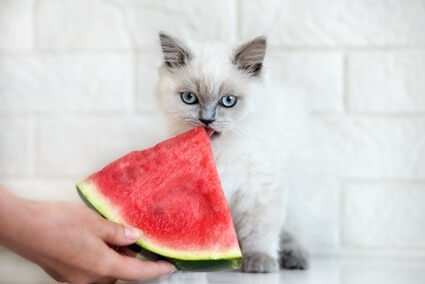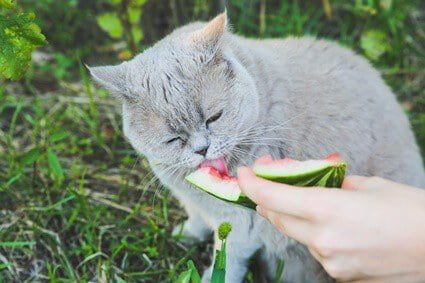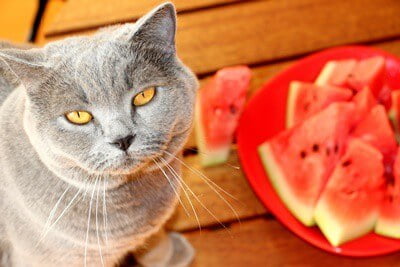Many cats show no interest in eating fruit, but watermelon may be an exception. The flesh of watermelon carries a scent comparable to meat. This makes it appealing and, in some cases, irresistible to the palate of certain cats.
Watermelon can be good for cats as its high water content can keep a cat hydrated during the summer. Watermelon is also rich in vitamins and minerals. Serve watermelon in moderation, as the fructose within can lead to weight gain. Always remove the rind and seeds from this fruit before offering it to a cat.
Never force a cat to eat melon. While there are advantages to eating this fruit, the health benefits can still be obtained from other food and hydration sources. If your cat does enjoy watermelon, ensure that it’s eaten in moderation.
Can You Give Cats Watermelon?
Watermelon is the ideal treat when it’s hot outside. As the average watermelon is made up of 92% water, it will be a natural source of hydration. Remove any harmful elements from the fruit so that it’s safe for cats to eat.
Watermelon can also benefit a cat’s health as it contains a range of vitamins and minerals. Watermelon is not the only source of such goodness, though, so don’t worry if your cat is indifferent to this food.
There are caveats attached to feeding watermelon to cats. You’ll need to remove any choking hazards and restrict servings to 1-2 times a week. If cats enjoy the taste of watermelon, you need to be mindful of the sugar content.
Can Kittens Eat Watermelon?
Watermelon should be kept away from kittens. Young cats obtain all the specialist nutrition they need from conventional cat food. Any additional intake must be managed with care.
Kittens will be more curious about watermelon than adult cats. In the mind of a kitten, anything is a snack or plaything. A kitten is more likely to harm itself by consuming rind or seeds, both of which must be removed from watermelon.
Even if you feed watermelon to a kitten safely, there may be consequences. The fructose in watermelon can cause the feline equivalent of a sugar rush. Kittens rarely need more energy.
Also, be wary of early, habit-forming experiences. Watermelon must always be fed in controlled quantities, reserved as a treat. If a kitten develops a taste for this fruit while young, it may experience weight control issues and dental problems later in life.
Do Cats Like Watermelon?
Many cats will reject the opportunity to eat watermelon. This is not through distaste but indifference. The sweetness that makes watermelon appealing to humans will leave cats cold.
As per PLoS One Genetics, the make-up of the feline tongue differs from other animals. The limited number of taste buds that cats possess cannot process sweetness. This is why cats are often indifferent to the taste of fruit.
You may be thinking that your cat is the exception to this rule, as it will gleefully devour pastries and cakes. It is fat that the cat is enjoying, not the sugar. Sweet foods are no more appealing to your pet than cat food will be to you.
Some cats still enjoy watermelon, especially if you slice it open. Cats may not be overly concerned with the taste of watermelon, but the smell of ripe fruit may attract feline attention. Watermelon contains the same amino acids as meat, so the aromas are roughly comparable.
This means that your cat may tear into a watermelon. The scent is firing up its hunting instincts, while the texture of the fruit will remind cats of small prey. Your cat may play with watermelon, make a mess, and decline to eat.

What Happens When Cats Eat Watermelon?
If you feed watermelon in appropriate amounts, no ill effects will befall your cat. The fruit will offer hydration and a handful of essential vitamins and minerals. This makes watermelon a helpful summer treat for hungry cats.
All the same, do not make watermelon a regular part of your pet’s diet. At most, any fresh fruit should not exceed 10% of a cat’s daily calorie intake. Any more than this can cause a stomach upset.
Even though watermelon has positive qualities, a cat can have too much of a good thing, including hydration and vitamins. To stave off the risk of a digestive upset or organ problems, offer watermelon sparingly.
Perhaps more importantly, watermelon is high in fructose. As cats cannot taste this ingredient, they may eat to excess. As explained by the Journal of Nutrition, the feline body struggles to metabolize sugar, including fructose.
Is Watermelon Dangerous for Cats?
Excessive watermelon consumption carries the risk of feline obesity, especially in senior felines. As cats grow older and exercise less, they are prone to weight gain. This makes diabetes more of an issue.
If your older cat enjoys watermelon and carries extra weight, have its blood glucose levels measured by a vet. As per The Journal of Feline Medicine and Surgery, a reading above 189 milligrams per deciliter is considered dangerous.
Beyond the hazards associated with weight gain, there are other concerns. The fructose found in fruit can impact the dental health of a cat. As cats grow older, tooth cleaning under anesthesia becomes increasingly risky.
You will also need to consider the physical impact of consuming watermelon on a cat. The rind, in particular, can be tough. This makes it a choking hazard for cats. An intestinal blockage could also occur if a cat swallows a chunk of the watermelon rind.
Is Watermelon Good for Cats?
Having discussed the risks of watermelon, it is important to note the nutritional benefit that this fruit can provide your pet. Cats have unique dietary needs that must be met.
Watermelon will not sustain a cat alone, but it does offer small health boosts. Of the elements of watermelon that are beneficial to cats, one cup of this fruit will offer the following helpful vitamins and minerals.
| Fiber: | Fiber ensures that cats maintain a healthy, regular bowel. Too much can cause stomach upset. |
| Lycopene: | This is an antioxidant that feeds oxygen to your cat’s organs, keeping them healthy in old age. |
| Magnesium: | Older cats are prone to urinary tract infections. Magnesium minimizes this risk. |
| Potassium: | Potassium is an electrolyte that boosts kidney performance in cats. |
| Vitamin A: | This vitamin keeps a cat’s skin and coat in good condition and bolsters night vision. |
| Water: | Over 90% of watermelon flesh is made of water, making this fruit hydrating. |
If watermelon is offered in appropriate portions, it can be considered a healthy addition to a cat’s diet. Do not make your pet eat this fruit if it shows aversion, though. The benefits are not sizeable enough to trouble yourself or your cat.
Feeding Watermelon to Cats
If you have decided that you would like to offer watermelon to your cat, learn how to safely. As we have pointed out, moderation is key. What’s more, some techniques for feeding watermelon are safer than others.
Ensure that the watermelon is ripe. This is easy to test. Ripe watermelons are packed with water and thus heavy to the touch. If the watermelon feels hollow, it should not be eaten by cats or humans alike.
Gently tap the watermelon, too. If the sound is dull or light, the water has either evaporated or failed to form. Either way, the fruit is not fit for consumption. Only feed watermelon that creates a deep thud when struck.
The best way to feed watermelon is to invest in a melon baller. This way, you can scoop out an appropriate serving. This can be applied to a cat’s bowl or fed by hand as a treat.
Alternatively, consider freezing chunks of watermelon into ice cubes. This can be particularly effective on a hot day. As cats can be reluctant to drink water, licking ice cubes is the next best thing, even when overheating.
Can Cats Eat Watermelon Rind?
It can take a cat several hours to chew through watermelon rind. While this will distract your cat, preventing chewing of furnishings or wires, patience may run thin.
When this happens, the cat will try to swallow large chunks of the rind to get to the flesh within. As watermelon rind is so solid, this is unlikely to be digested. A blockage in the throat or intestine becomes likely.
Even if the cat does digest watermelon rind, it takes a long time. Throughout the process, your cat will feel bloated and will likely experience a cramping stomach. Trim the rind from watermelon and offer it in small, fleshy chunks.

Can Cats Eat Watermelon Seeds?
As a potential choking hazard, seeds should be kept away from cats. They are often too small to chew. If your cat does bite into a seed, it may break a tooth. Worse, as per the Research Journal of Environmental Sciences, watermelon seeds contain cyanide.
Some cats may get lucky if they consume a watermelon seed. It may pass through the digestive tract with no incident. This is a best-case scenario. If the cat’s body acknowledges just one watermelon seed, it will react.
This will typically involve purging. The cat will experience significant gastric distress in the form of vomiting and diarrhea. This usually occurs within an hour of consuming the seed. Dehydration will follow – do not replace lost water with more watermelon.
Most reputable supermarkets will stock seedless watermelons. If you want to share this fruit with your cat, shop for such a variety. If this is not possible, remove all seeds before serving.
Can Cats Drink Watermelon Juice?
We mentioned previously that cats are sometimes fussy about drinking water. Applying the juice of a watermelon to a water bowl may help or hinder this. It depends on the mindset of the cat.
As watermelon carries a similar scent to meat, your cat may be tempted to investigate the water. Alas, the opposite may happen. Your cat may deem the bowl contaminated by food and refuse to countenance drinking from it.
If you do add watermelon juice to water, do so sparingly. You could also use the juice to moisten kibble if your cat is reluctant to eat dry food. This is more likely to be more successful than adding it to water.
If you do plan to offer watermelon juice to cats, make your own. Flavored water from a supermarket should never be used. These bottles are loaded with sugar and artificial sweeteners, making them a danger to feline health.
Is it safe for cats to eat watermelon? As is so often the case, the answer is yes, in moderation. If your cat enjoys watermelon, it will offer hydration and vitamins in the summer months. Do not be surprised if your cat remains indifferent, though. The sweetness of this fruit means that it will not be a favorite for many felines.

